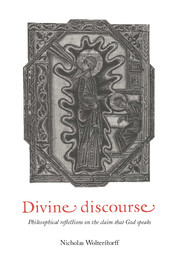Book contents
- Frontmatter
- Contents
- Preface
- 1 Locating our topic
- 2 Speaking is not revealing
- 3 The many modes of discourse
- 4 Divine discourse in the hands of theologians
- 5 What it is to speak
- 6 Could God have and acquire the rights and duties of a speaker?
- 7 Can God cause the events generative of discourse?
- 8 In defense of authorial-discourse interpretation: contra Ricoeur
- 9 In defense of authorial-discourse interpretation: contra Derrida
- 10 Performance interpretation
- 11 Interpreting the mediating human discourse: the first hermeneutic
- 12 Interpreting for the mediated divine discourse: the second hermeneutic
- 13 Has Scripture become a wax nose?
- 14 The illocutionary stance of biblical narrative
- 15 Are we entitled?
- 16 Historical and theological afterword
- Notes
- Index
Preface
Published online by Cambridge University Press: 01 June 2011
- Frontmatter
- Contents
- Preface
- 1 Locating our topic
- 2 Speaking is not revealing
- 3 The many modes of discourse
- 4 Divine discourse in the hands of theologians
- 5 What it is to speak
- 6 Could God have and acquire the rights and duties of a speaker?
- 7 Can God cause the events generative of discourse?
- 8 In defense of authorial-discourse interpretation: contra Ricoeur
- 9 In defense of authorial-discourse interpretation: contra Derrida
- 10 Performance interpretation
- 11 Interpreting the mediating human discourse: the first hermeneutic
- 12 Interpreting for the mediated divine discourse: the second hermeneutic
- 13 Has Scripture become a wax nose?
- 14 The illocutionary stance of biblical narrative
- 15 Are we entitled?
- 16 Historical and theological afterword
- Notes
- Index
Summary
That strange but rivetting declaration, both unsettling and consoling if true, introduced most emphatically into our human odyssey by Judaism, that God speaks to us on our way, and that, accordingly, our calling as human beings is to listen to that speech from beyond and “hear” – I knew almost at once after receiving the invitation to be Wilde Lecturer at Oxford University during Michaelmas Term 1993 that this was what I wanted to discuss. I realized, of course, that most of my philosophical colleagues would regard the topic as “off the wall” for a philosopher – or something one would have to be slightly mad to take seriously. But now, as the twentieth century draws to its close, the conviction is slowly emerging in many quarters that perhaps the hostility of us moderns to the religious traditions which brought us forth and have so long nourished us has been ill-advised and self-defeating. And deep in the traditions of Judaism, Christianity, and Islam, is the attribution of speech to God. To excise those attributions from those religions would be to have only shards left.
So “off the wall” or not – that was my topic. Might it be the case that contemporary philosophy is at a place where it is possible to reflect in fresh ways on the declaration: “And God said …” Central in the philosophical thought of our century has been the topic of language.
- Type
- Chapter
- Information
- Divine DiscoursePhilosophical Reflections on the Claim that God Speaks, pp. ix - xPublisher: Cambridge University PressPrint publication year: 1995



